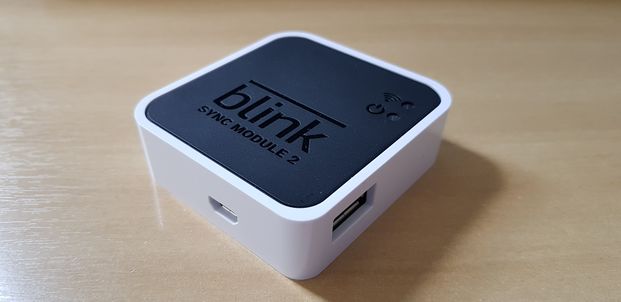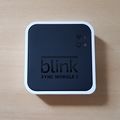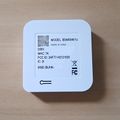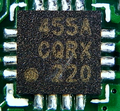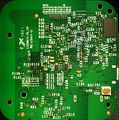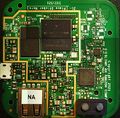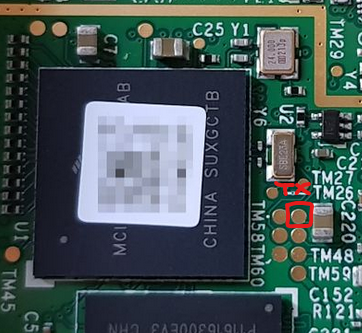Difference between revisions of "Blink SyncModule 2"
Jump to navigation
Jump to search
m |
(I updated this entry to have more accurate information about the previously unknown transceiver IC.) |
||
| (8 intermediate revisions by one other user not shown) | |||
| Line 2: | Line 2: | ||
[[File:Photo3.jpg|621x621px|thumb]] | [[File:Photo3.jpg|621x621px|thumb]] | ||
==What is it?== | ==What is it?== | ||
| + | [[Home]] appliance to control other [[Amazon]] [[Blink]] devices. | ||
| + | |||
According to the manufacturer: | According to the manufacturer: | ||
| − | "The Sync Module is a hub that plugs into an electrical outlet to relay commands and network details to devices in the system it manages. The Sync Module 2 requires a power outlet and is connected to your always-on Wi-Fi network to handle activity for up to ten Blink devices. This extends camera battery life, saves clips without a subscription, improves convenience for scheduling, and arms a group of devices at once."<ref>[ https://support.blinkforhome.com/en_US/faq-sm/sync-module-2-faqs]</ref> | + | "The Sync Module is a hub that plugs into an electrical outlet to relay commands and network details to devices in the system it manages. The [https://support.blinkforhome.com/en_US/faq-sm/sync-module-2-faqs Sync Module 2] requires a power outlet and is connected to your always-on Wi-Fi network to handle activity for up to ten [[Blink]] devices. This extends camera battery life, saves clips without a subscription, improves convenience for scheduling, and arms a group of devices at once."<ref>[ https://support.blinkforhome.com/en_US/faq-sm/sync-module-2-faqs]</ref> |
==What can it do?== | ==What can it do?== | ||
| Line 14: | Line 16: | ||
==Main components== | ==Main components== | ||
===Microcontroller=== | ===Microcontroller=== | ||
| − | NXP MCIMX6Z0DVM09AB<ref name="NXP MCIMX6Z0DVM09AB"> | + | NXP MCIMX6Z0DVM09AB<ref name="NXP MCIMX6Z0DVM09AB">https://www.nxp.com/part/MCIMX6Z0DVM09AB#/</ref> |
| − | *ARM Cortex-A7 running Linux | + | *[[ARM]] [[Cortex-A7]] running Linux |
*900MHz | *900MHz | ||
*SRAM: 128kB | *SRAM: 128kB | ||
| Line 24: | Line 26: | ||
===Wifi/Bluetooth Module=== | ===Wifi/Bluetooth Module=== | ||
| − | NXP 88W8987-NYE2<ref name="NXP 88W8987-NYE2"> | + | [[NXP]] 88W8987-NYE2<ref name="NXP 88W8987-NYE2">https://www.nxp.com/products/wireless-connectivity/wi-fi-plus-bluetooth-plus-802-15-4/2-4-5-ghz-dual-band-1x1-wi-fi-5-802-11ac-plus-bluetooth-5-2-solution:88W8987</ref> |
*2.4/5Ghz Wifi | *2.4/5Ghz Wifi | ||
| Line 30: | Line 32: | ||
===Serial flash=== | ===Serial flash=== | ||
| − | Winbond 25Q256JVEQ<ref name="Winbond 25Q256JVEQ"> | + | [[Winbond]] 25Q256JVEQ<ref name="Winbond 25Q256JVEQ">https://www.winbond.com/hq/product/code-storage-flash-memory/serial-nor-flash/?__locale=en&partNo=W25Q256JV</ref> |
*256M-bit | *256M-bit | ||
| Line 36: | Line 38: | ||
===RAM=== | ===RAM=== | ||
| − | ISSI IS43TR16640BL<ref name="ISSI IS43TR16640BL"> | + | [[ISSI]] IS43TR16640BL<ref name="ISSI IS43TR16640BL">https://www.issi.com/WW/pdf/43-46TR16640B-81280BL.pdf</ref> |
*1GB SDRAM | *1GB SDRAM | ||
*16bit DDR3 | *16bit DDR3 | ||
| + | |||
| + | ===Sub-GHz "EZRadio" Transceiver=== | ||
| + | Markings: 455A CQRX 220 | ||
| + | |||
| + | Silicon Labs Si4455<ref>https://www.silabs.com/documents/public/data-sheets/Si4455.pdf</ref> | ||
| + | |||
| + | * Frequency of 283–960 MHz | ||
| + | * –116 dBm Sensitivity | ||
| + | * Modulation: | ||
| + | ** (G)FSK | ||
| + | ** OOK | ||
| + | * +13 dBm Max output power | ||
| + | * 50 nA Standby Current | ||
| + | * 500 kbps Max Data Rate | ||
| + | * 1.8 to 3.6 VDC | ||
==Teardown pictures== | ==Teardown pictures== | ||
| Line 53: | Line 70: | ||
File:Photo10.jpg|MCU closeup | File:Photo10.jpg|MCU closeup | ||
File:Photo11.jpg|SRAM closeup | File:Photo11.jpg|SRAM closeup | ||
| + | File:Unknown ic.png|Si4455 | ||
File:Photo12.jpg|Wifi/BT module closeup | File:Photo12.jpg|Wifi/BT module closeup | ||
| + | File:Bottom layer zoom.jpg | ||
| + | File:Sync module 2 top layer zoom.jpg | ||
</gallery> | </gallery> | ||
| + | ==Serial Communications== | ||
| + | It is possible to read the boot of the device by connecting to the indicated pin. | ||
| + | |||
| + | Baud rate is 115200. | ||
| + | [[File:Txpin.png|none|frame]] | ||
| + | |||
| + | ==References== | ||
<references /> | <references /> | ||
Latest revision as of 13:59, 22 September 2023
Contents
What is it?
Home appliance to control other Amazon Blink devices.
According to the manufacturer: "The Sync Module is a hub that plugs into an electrical outlet to relay commands and network details to devices in the system it manages. The Sync Module 2 requires a power outlet and is connected to your always-on Wi-Fi network to handle activity for up to ten Blink devices. This extends camera battery life, saves clips without a subscription, improves convenience for scheduling, and arms a group of devices at once."[1]
What can it do?
- Control Blink devices (cameras, doorbells, etc) from the Blink mobile app
- Connect up to 10 of any Blink Outdoor 4, Wired Floodlight, Outdoor and Indoor (all models), XT2, XT, Video Doorbell*, and Mini* cameras.
- Support local video storage for up to 10 Blink cameras.
- Record and store motion clips when you insert a USB flash drive (up to 256 GB).
Main components
Microcontroller
NXP MCIMX6Z0DVM09AB[2]
- ARM Cortex-A7 running Linux
- 900MHz
- SRAM: 128kB
- SPI/UART/I2C
- 96KB bootrom, 128KB internal RAM
- Has Arm TrustZone
Wifi/Bluetooth Module
- 2.4/5Ghz Wifi
- Bluetooth 5.2 (BLE also)
Serial flash
- 256M-bit
- Dual/Quad SPI XIP (133MHz SPI)
RAM
- 1GB SDRAM
- 16bit DDR3
Sub-GHz "EZRadio" Transceiver
Markings: 455A CQRX 220
Silicon Labs Si4455[6]
- Frequency of 283–960 MHz
- –116 dBm Sensitivity
- Modulation:
- (G)FSK
- OOK
- +13 dBm Max output power
- 50 nA Standby Current
- 500 kbps Max Data Rate
- 1.8 to 3.6 VDC
Teardown pictures
Serial Communications
It is possible to read the boot of the device by connecting to the indicated pin.
Baud rate is 115200.
References
- ↑ [ https://support.blinkforhome.com/en_US/faq-sm/sync-module-2-faqs]
- ↑ https://www.nxp.com/part/MCIMX6Z0DVM09AB#/
- ↑ https://www.nxp.com/products/wireless-connectivity/wi-fi-plus-bluetooth-plus-802-15-4/2-4-5-ghz-dual-band-1x1-wi-fi-5-802-11ac-plus-bluetooth-5-2-solution:88W8987
- ↑ https://www.winbond.com/hq/product/code-storage-flash-memory/serial-nor-flash/?__locale=en&partNo=W25Q256JV
- ↑ https://www.issi.com/WW/pdf/43-46TR16640B-81280BL.pdf
- ↑ https://www.silabs.com/documents/public/data-sheets/Si4455.pdf
